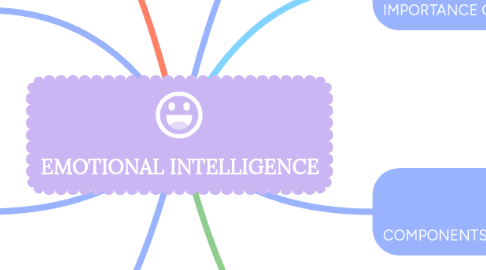EMOTIONAL INTELLIGENCE
by Breanna Cruzit


1. DIMENTIONS OF EMOTIONAL INTELLIGENCE
1.1. Emotional agility
1.1.1. Adapting to emotional shifts
1.2. Emotional resilience
1.2.1. Coping with stress and adversity
1.3. Emotional literacy
1.3.1. Expressing emotions constructively
2. CHALLENGES OF MENTAL HEALTH
2.1. Having a hard time understanding emotions
2.2. Lack of self-control
2.3. Misinterpretation of other’s emotions
2.4. Not having supports
3. WAYS TO IMOROVE MENTAL HEALTH
3.1. Practice mindfulness and emotional regulation techniques
3.2. Seek feedback from others to improve self-awareness
3.3. Engage in active listening to strengthen empathy
3.4. Develop conflict resolution skills through practice
4. DEVELOPING EMOTIONAL INTELLIGENCE
4.1. Journaling emotions
4.2. Active listening
4.3. Seeking feedback
4.4. Continous self-reflection
5. DEFINITION
5.1. It is the ability to understand and manage your own emotions/feelings, and also to others.
6. IMPORTANCE OF EMOTIONAL INTELLIGENCE
6.1. Personal growth
6.2. Building relationships
6.3. Mental health
6.4. Decision-making and conflict resolution.
7. COMPONENTS OF EMOTIONAL INTELLIGENCE. ( Daniel Goleman’s Model)
7.1. SELF AWARENESS
7.1.1. Start recognizing your own emotions rather than ignoring it.
7.2. SELF REGULATION
7.2.1. Focus on controlling your emotion impulses.
7.3. MOTIVATION
7.3.1. Focus on your goals
7.4. EMPATHY
7.4.1. Instead of ignoring other’s emotions, start understanding theirs too just like how you’re trying to understand yours.
7.5. SOCIAL SKILLS
7.5.1. Start building relationships with others and socialize.
8. APPLICATION OF EMOTIONAL INTELLIGENCE
8.1. IN PERSONAL LIFE:
8.1.1. Building stronger relationships
8.2. IN WORKPLACE:
8.2.1. Improves teamwork
8.3. IN EDUCATION:
8.3.1. Supporting each other’s mental health well-being
